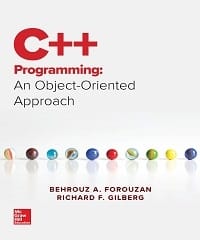 Free download C++ Programming: An Object-Oriented Approach in PDF written by Behrouz A. Forouzan, Richard F. Gilberg and Published by McGraw-Hill Education.
Free download C++ Programming: An Object-Oriented Approach in PDF written by Behrouz A. Forouzan, Richard F. Gilberg and Published by McGraw-Hill Education.
According to the Authors, “This book complements a course designed to teach object-oriented programming using the syntax of the C++ language. It will also prepare students for advanced concepts such as data structure and design patterns. Students who have completed this course will be ready to take on any other object-oriented language course, a data-structure course, or a course about design patterns.
What Is the C++ Language?
C++ is a progressive programming language derived from its predecessors, the C language and the B language. The C++ language expands the idea of a struct to a class in which different objects can be created from one single definition of a class with different values for each data element.
Furthermore, the C++ language explores the idea of object-oriented languages that simulate real life. In real life, we define a type and then we have objects of that type. In the C++ language, we define a class and then we create objects from that class. C++ also includes the idea of inheritance. In inheritance, we can create a class and then extend the definition to create other classes, just as in real life where the idea of an animal can be extended to create the idea of a horse, a cow, a dog, and so on.
The most recent additions to C++ include the Standard Template Library (STL), a collection of predefined complex objects and actions that can be applied to those objects, as well as design patterns to make problem solving more efficient and coherent.
Why This Book?
The book can be used as the first course in computer programming using the C++ language as the vehicle. Chapters 1 to 6 are designed for this purpose. They discuss computer systems and languages. They also discuss the basics of the C++ syntax and program controls, such as decisions and repetitions. 1 to 6 are essential to learning programming using the C++ language.
Chapters 7 to 12 are essential in the study of object-oriented programming. Although Chapters 8 and 9 are not directly related to the object-oriented features of C++, we believe that these two chapters can be taught after students understand the basics of object-oriented programming, which are discussed in Chapter 7. Chapters 13 to 17 discuss other topics normally taught in a first or second course in programming. They can be taught in any order
Chapters 18 and 19 are an introduction to data structures. They prepare students for a course in data structures. Chapter 20 (which can be found online) gives simple and alternative solutions to some typical problems in object-oriented programming that would be more difficult to solve if patterns were not used.
Table of Contents
- Introduction to Computers and Programming Languages
- Basics of C++ Programming
- Expressions and Statements
- Selection
- Repetition
- Functions
- User-Defined Types: Classes
- Arrays
- References, Pointers, and Memory Management
- Strings
- Relationships among Classes
- Polymorphism and Other Issues
- Operator Overloading
- Exception Handling
- Generic Programming: Templates
- Input/output Streams
- Recursion
- Introduction to Data Structures
- Standard Template Library (STL)
- Design Patterns (Available online)
Free download C++ Programming: An Object-Oriented Approach in PDF written by Behrouz A. Forouzan and Richard F. Gilberg from following download links.
Password for Download Links: ComputingSavvy
File Size: 29.9 MB Pages: 959 Please Read Disclaimer
Unable to download? kindly read the Download Instructions.
Don’t forget to drop a comment below after downloading this book.
P.S. If download links are not working, kindly drop a comment below, so we’ll update the download link for you
You may also like to download A Tour of C++ in PDF